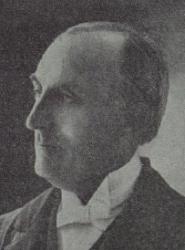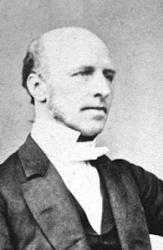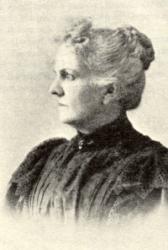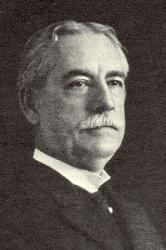Planning worship?
Check out our sister site, ZeteoSearch.org,
for 20+ additional resources related to your search.
- |
User Links
Person Results
‹ Return to hymnal





Export as CSV
Mrs. L. M. Beal Bateman
1843 - 1943 Person Name: Mrs. L. M. B. Bateman Hymnal Number: 50 Author of "Little Feet, Be Careful" in Glad Songs Pseudonym: Grace Glenn; Lucinda M. Beal Bateman lived in Ionia, Michigan. She wrote A book of rhymes to suit the times published about 1886 by N. Chapin & Son (Chicago); Gleams of gold published about 1889, and The prohibition speaker: a collection of readings, recitations, dialogues, tableux and songs for temperance and prohibition entertainments published in 1889 by Filmore Bros. (Cincinnati). She married Zadoc Henry Bateman in 1875. They had one daughter, Grace.
Dianne Shapiro, from "A book of rhymes to suit the times" and "The Genealogy of Dennis Bowen Caskey and Michelle Lynn Smith" (caskey-family.com/genhome, retrieved 7-1-2018)
Mrs. L. M. Beal Bateman
J. H. Rosecrans

1845 - 1926 Hymnal Number: 50 Composer of "[I washed my hands this morning]" in Glad Songs James Holmes Rosecrans studied at the Baxter University of Music in Friendship, New York. After teaching for two years, he joined the Fillmore Brothers Music House in Cincinnati, Ohio. As of 1880, he was teaching music in Douglas County, Colorado. In 1884, was an evangelist in California, and later was associated with evangelistic efforts in Texas, and taught music and Bible at Carlton College in Bonham, Texas. He published over 20 music collections in his lifetime.
© The Cyber Hymnal™ (www.hymntime.com/tch)
J. H. Rosecrans
Robert Prescott Stewart
1825 - 1894 Person Name: Robert P. Stewart Hymnal Number: 88 Composer of "[Blessed Master, I have promised]" in Glad Songs
Robert Prescott Stewart
T. R. Birks

1810 - 1883 Hymnal Number: 90 Author of "Our Gentle Savior" in Glad Songs Birks, Thomas Rawson, M.A., b. Sept. 1810, and educated at Trinity College, Cambridge (B.A. 1834, M.A. 1837), of which he subsequently became a Fellow. Having taken Holy Orders in 1837, he became Rector of Kelshall, Herts, 1844; Vicar of Holy Trinity, Cambridge, 1866; Hon. Canon of Ely Cathedral, 1871; and Professor of Moral Philosophy, Cambridge, 1872. He d. at Cambridge, July 21, 1883. His works, to the number of 25, include Biblical, Astronomical, Scientific, Prophetic, and other subjects. He also wrote the Memoirs of the Rev. E Bickersteth (his father-in-law), 2 vols., 1851. His hymns appeared in Bickersteth's Christian Psalmody; 1833; and, together with Versions of the Psalms, in his Companion Psalter, 1874. They number upwards of 100. [Eng. Psalters, § xx.] Very few are in common use in Great Britain, but in America their use is extending. They include:—
1. Except the Lord do build the house. Ps. cxxvii.
2. O come, let us sing to the Lord. Ps. xcv.
3. O King of Mercy, from Thy throne on high. Ps. lxxx.
4. O taste and see that He is good. Ps. xxxiv.
5. O when from all the ends of earth. Psj xiv.
6. The heavens declare Thy glory. Ps. xix.
7. The Lord Himself my Portion is. Ps. liii.
8. The mighty God, the Lord hath spoken. Ps. l.
9. Thou art gone up on high, O Christ, &c. Ps. xlvii.
10. Whom have I [we] Lord in heaven, but Thee. Ps. lxxiii.
Of these versions of the Psalms, all of which date from 1874, the most popular is No. 3. Mr. Birks' compositions are worthy of greater attention than they have hitherto received.
--John Julian, Dictionary of Hymnology (1907)
T. R. Birks
S. W. Straub
1842 - 1899 Hymnal Number: 17 Composer of "[God sees the little sparrow fall]" in Glad Songs Solomon.W Straub Solomon was the brother of Maria Straub. His father Joseph was a farmer. His parents, who were of German descent.
From Hymnary user, via email
S. W. Straub
Charles T. Brooks

1813 - 1883 Person Name: Chas. T. Brooks Hymnal Number: 59 Author of "God Bless Our Land" in Glad Songs Brooks, Charles Timothy. An American Unitarian Minister, born at Salem, Mass., June 20, 1813, and graduated at Harvard, 1832, and the Divinity School, Cambridge, U.S., 1835. In that year he began his ministry at Nahant, subsequently preaching at Bangor and Augusta (Maine), Windsor (Vermont). In 1837 he became pastor of Newport, Rhode Island, and retained the same charge until 1871, when he resigned through ill-health. [Rev. F. M. Bird, M.A.]
-- John Julian, Dictionary of Hymnology (1907)
================
Brooks, C. T. (p. 184, i,). He died at Newport, Rhode Island, June 14, 1883.
--John Julian, Dictionary of Hymnology, Appendix, Part II (1907)
Charles T. Brooks
Laura E. Newell

1854 - 1916 Hymnal Number: 63 Author of "Children's Offering" in Glad Songs Born: February 5, 1854, New Marlborough, Connecticut.
Died: October 13, 1916, Manhattan, Kansas.
Daughter of Mr. and Edward A. Pixley, but orphaned as an infant, Laura was adopted by her aunt, then Mrs. Hiram Mabie, who at the time lived in New York. In 1858, the Mabie family moved to a farm south of where Wamego, Kansas, now stands. Two years after the move, Mr. Mabie died, and his wife resumed teaching.
In 1860, Mrs. Mabie accepted a position in Topeka, Kansas, where she taught many years. Under her tutelage, Laura received her education. As early as age 12, Laura was writing rhymes, and two years later her poems began to appear in local newspapers. She had no thought of a literary career; she simply wrote to give vent to her poetical mind.
In 1871, Laura married Lauren Newell, a carpenter from Manhattan, Kansas. They had at least six children, and belonged to the Congregational denomination.
In 1873, Laura was listening to an address by a speaker who lamented the death of "genuine" hymns, and she resolved to try her hand in that line of work. That began a long period of writing songs, sacred and secular, services for all anniversary occasions, cantatas, adapting words to music, and music to words.
"Mrs. Newell is indeed a prolific writer. Her poems number in the thousands. She has had over eight hundred poems published in a single year, a most remarkable record. The great ease with which Mrs. Newell writes is one of her special gifts. Not long since an order, accompanied by music and titles, was sent her for eight poems to suit. At seven o’clock in the evening she sat down to her organ to catch the music. Then she went to her desk, and at ten o’clock the order was ready for the return mail. Her work pleased the publisher so well that he sent her an order for forty-eight additional poems. Mrs. Newell writes several hundred poems annually.
She is a very modest and unpretentious lady, and goes about her daily work as cheerfully as her poems advise others to do. The deeply religious character of the woman stands out boldly in nearly all her work. The next world is apparently as real to her as the present. Her heart is in her work, and to the end of life’s chapter, while able, may she wield her pen to tell the Story to dear to her heart, in verse and song." Hall, pp. 316-17
http://www.hymntime.com/tch/bio/n/e/w/newell_lep.htm
Laura E. Newell
Ida Scott Taylor
Hymnal Number: 45 Author of "Rally Day Call" in Glad Songs Pseudonymn. See also Crosby, Fanny
Ida Scott Taylor
B. C. Unseld

1843 - 1923 Hymnal Number: 69 Composer of "[Twilight is stealing]" in Glad Songs Benjamin Carl Unseld, 1843-1923
Born: October 18, 1843, Shepherdstown, West Virginia.
Died: November 19, 1923.
Buried: Elmwood Cemetery, Shepherdstown, West Virginia.
After leaving school at age 14, Unseld worked as a clerk in a country store. He received his first musical instruction around age 15, from a companion who had attended a singing school. He was shown the representation of the scale in the old Carmina Sacra, and had it sung for him. At the friend’s suggestion, he got permission from his pastor to practice on the church organ. Since both boys worked, their only chance to practice was after the store closed at 9:00 p.m., and occasionally at noontime. They went to the church together and took turns, one at the keyboard and the other at the bellows.
Shortly after the Battle of Antietam in September 1862, some of which Unseld witnessed, he left home and became a bookkeeper in the general offices of a railroad in Columbia, Pennsylvania. He sang in a choir, and gained further practice reading music. He rented a melodeon and spent much time in his room improvising on it. He bought a copy of Woodbury’s Harmony and Musical Composition, and studied it as well as he could without a teacher. He accepted an invitation to play the organ in the local Methodist church, on the condition that he received the tunes early in the week so he could learn them. This was his first position as an organist.
In the spring of 1866, he entered the Musical Institute in Providence, Rhode Island, conducted by Eben Tourjée (founder of the New England Conservatory in Boston, Massachusetts, and father of Lizzie Tourjée). There he studied voice, piano, organ, and harmony. After learning of Unseld’s business experience, Dr. Tourjée made him secretary of the school; in 1867, Unseld became the first secretary of the New England Conservatory.
Starting in 1870, Unseld attended schools led by Theodore F. Seward. There he met George Webb, Lowell Mason, James McGranahan, Charles Case, and other notables in the music community. In 1874, Unseld taught at Fisk University in Nashville, Tennessee, and helped train Fisk’s Jubilee Singers for their European trip. In 1877 and 1878, he was organist and choir master at St. James’ Episcopal Church, Lancaster, Pennsylvania.
In 1879, Unseld moved to New York City, and for 15 years taught, led choirs, composed and published. In New York, his musical headquarters was the publishing house of Biglow & Main Company, where he was in almost daily contact with the popular composers and teachers of the day: Ira Sankey, Horatio Palmer, Hubert Main, Robert Lowry, et al. In 1894, Unseld moved to Cincinnati, Ohio, and worked as an editor for the Fillmore Music House. In 1898, he moved to Dayton, Ohio, and worked in a similar capacity for the Lorenz Publishing Company. He moved back to New York City in 1901, then to Hagerstown, Maryland in 1905. He and his wife Sallie were apparently living in Tennessee as of 1920. Unseld’s works include:
The Choral Standard (New York: Fillmore Brothers, 1895)
Progress in Song, with E. T. Hildebrand (Cincinnati, Ohio: The Fillmore Brothers Company)
Unseld was inducted into the Southern Gospel Music Association Hall of Fame in 2004.
Sources--
Hall, pp. 239-44
Music--
Ancyra
Euphemia
He Is Risen
Hordville
Make Haste!
Meschach
Twilight Is Falling
Unseld
Wonderful Message
--www.hymntime.com/tch
B. C. Unseld
Margaret Coote Brown
Person Name: M. C. B. Hymnal Number: 58 Author of "The World Children For Jesus" in Glad Songs Early 20th Century
Margaret Coote Brown


 My Starred Hymns
My Starred Hymns


